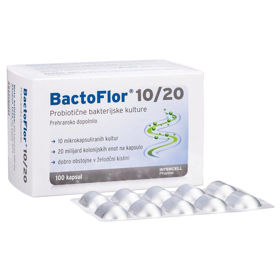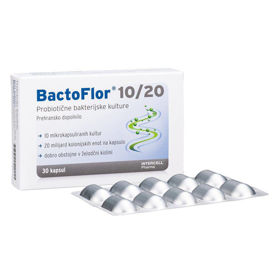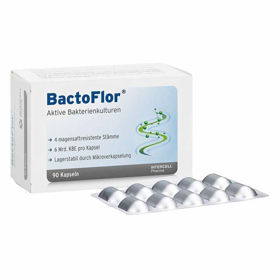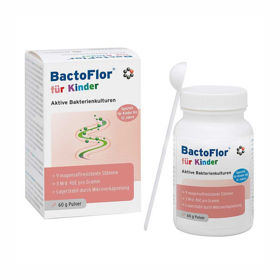Bactoflor powder is an innovative food supplement for children, with many bacterial cultures , and its advantage is that the product can be consumed by babies from 1 week onwards.
The amount of live microorganisms in the Bactoflor product is favorable for the child's digestive tract, which is not yet fully colonized with bacterial cultures at the beginning of life.
Bactoflor for children thus provides a comprehensive supply of positive bacterial cultures. Bacteria complement each other, and their diversity prevents any of them from multiplying excessively.
Bactoflor powder also contains inulin, which is food for bacterial cultures so that they grow well. Many bacterial cultures in the food supplement really help to supplement the optimal bacterial population in the child's digestive tract.
What does Bactoflor for children contain?
Bactoflor contains as many as 10 different bacterial cultures namely:
- Bifidobacterium bifidum
- Bifidobacterium breve
- Bifidobacterium longum
- Lactobacillus acidophilus
- Lactobacillus casei
- Lactobacillus reuteri
- Lactobacillus rhamnosus
- Lactobacillus plantarum
- Lactobacillus lactis
- Enterococcus faecium
When to offer your child good bacteria?
If your child has been sick for a long time, has digestive problems, or is taking antibiotics, this may be a particularly good time to introduce a probiotic supplement into your child's routine.
Sometimes medicines that our babies or toddlers have to take, such as antibiotics, can upset the balance in the gut. This can significantly reduce the body's ability to protect itself from germs and unwanted foreign substances, meaning that the child is more susceptible to developing antibiotic-associated diarrhoea.
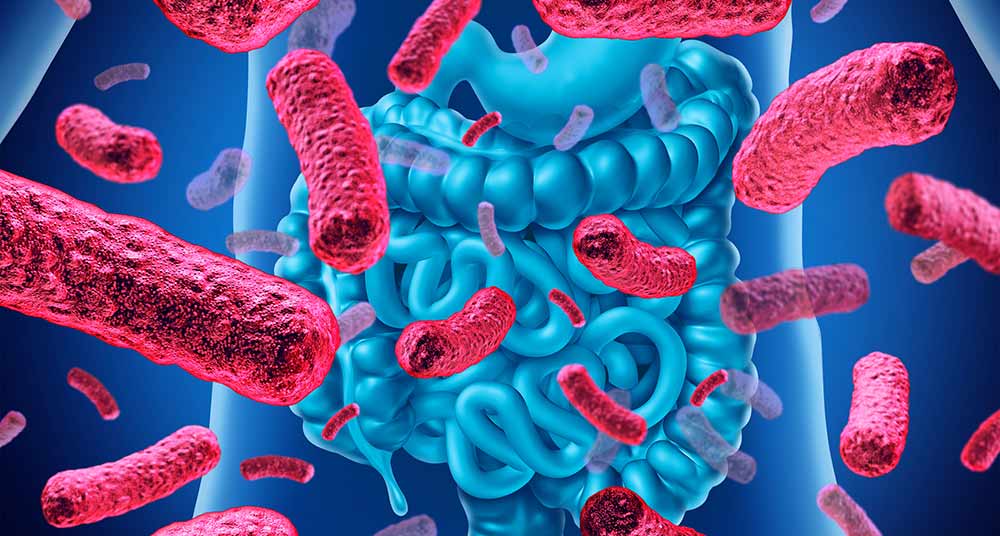
Sometimes your child just has diarrhea for a variety of reasons (most likely a viral or bacterial infection). Research has shown that there can be a reduction in the frequency of stools and the duration of diarrhea in children if they take a food supplement containing Lactobacillus rhamnosus and Saccharomyces boulardii.
Functional abdominal pain (which may or may not be associated with diarrhea, constipation, flatulence) has been shown to improve the severity of pain experienced with L. reuteri (but some studies suggest that Lactobacillus rhamnosus may have also benefits).
How to ensure good digestion in a child
Bad eating habits can cause problems in your child's digestive system. Ensure good digestion and well-being of your child with a few quick adjustments to diet and lifestyle.
Fibers
Fiber-rich foods such as whole grains, fruits and vegetables can do wonders for a person's digestive tract. Toddlers aged one to three should aim for 19g of fiber a day, so give them apples, raspberries and wholemeal bread.
Fun sports activity and exercise
Not only is exercise great for your baby's overall well-being, it's also a key aspect of digestive health. The exercises should be light and fun, but they should also be active - this will stimulate the movement of food through the child's digestive tract and help with their digestion.
Don't forget about adequate hydration
Hydration is crucial for the smooth functioning of digestion and intestinal flora. If you want to make drinking water more appealing to your child, add fresh fruit juice, such as lemon or berry, to the water for extra flavor (no sugar, of course).
Several smaller meals
Have the child eat smaller meals more often during the day. This will make it less likely that your child will experience the discomfort of bloating and will also be less likely to overload their digestive system with heavy portions of food.
Avoid overeating
Monitor your child's eating habits and make sure he doesn't eat too fast and too much. When eating out, divide the food on serving plates so that the child does not overdo it with too large portions, which can make it difficult for the digestive system.
Offer enough enzymes
Our body produces enzymes that help us break down food. These enzymes can also be found in our saliva, so we should always encourage thorough chewing so that all these things combine with the enzymes. Other natural options can be found in foods such as papaya, mango, honey and pineapple.
Try to avoid certain foods
Processed food, such as instant canned food or candyi snacks, it usually lacks nutrients, fiber and enzymes. It is also full of trans fats and other preservatives that can cause constipation and malnutrition when consumed regularly. Try to feed your child more fruits and vegetables - his digestive tract will thank you for it.
Be yourself as an example
After all, children learn from their parents and immediate family. Eat as healthy as possible and make exercise a family activity - these great habits are just as beneficial for adults as they are for children. In addition, this will also help you bond with your child and make healthy living an integral part of your family life.
Interesting reading: BactoFlor 10/20 - forum and experiences<; /p>;







